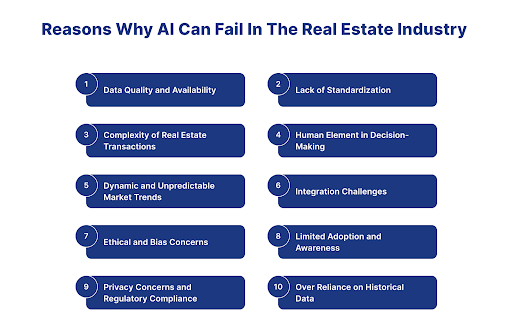10 Reasons AI Can Fail in the Real Estate Industry (Don’t Ignore #3)
just like every other technology, artificial intelligence has its shortcomings. This blog will examine situations where AI can fail in the real estate industry.
Introduction

- The real estate business has always embraced innovation, adopting new technology to improve client experiences and expedite procedures. AI has been a disruptive force in a number of industries in recent years, offering personalized services, predictive analytics, and effective automation. But just like every other technology, artificial intelligence has its shortcomings. This blog will examine situations where AI can fail in the real estate industry. While there is no doubt that artificial intelligence (AI) can completely transform how we invest in, acquire, and sell real estate, it is imperative to look at the triumphs and the failures to grasp its implications fully.
Reasons why AI can fail in the real estate industry

1.Data Quality and Availability
- Data is one of the core tenets of AI. Data in real estate might vary widely in terms of quality and availability. Incomplete datasets, inconsistent formats, and various data sources might prevent AI algorithms from producing valuable insights or precise predictions. AI can find it challenging to provide beneficial outcomes without thorough and reliable data. In this way, AI can fail in the real estate industry.
2.Lack of Standardization
- Data formats and terminologies are frequently not standardized in the real estate sector. AI systems may face difficulties due to disparate data formats and naming standards used on various platforms and geographical areas. AI algorithms find it challenging to learn and generalize insights across different real estate markets when there is a dearth of standardized data. By this way, AI can fail in the real estate industry.
3.Complexity of Real Estate Transactions
- The legal, financial, and regulatory aspects of real estate transactions are only a few elements that go into them. The intricacy of these transactions may be too much for AI algorithms to handle, particularly when complicated legal paperwork, subtle negotiating techniques, and shifting market circumstances are involved. By this way, AI can fail in the real estate industry.
4.Human Element in Decision-Making
- Real estate decisions frequently have a large human component, with individual tastes, feelings, and subjective assessments being very important. Artificial intelligence (AI) is excellent at handling quantitative data. Still, it can struggle to comprehend real estate decisions' emotional and affective factors, including a property's beauty or the intangible characteristics that draw people to a neighborhood. In this way, AI can fail in the real estate industry.
5.Dynamic and Unpredictable Market Trends
- Real estate markets are dynamic and prone to sudden shifts brought about by world events, governmental regulations, and economic variables. It may be difficult for AI models based on previous data to adjust to unanticipated events, making it difficult to predict market movements precisely. Artificial intelligence (AI) systems must be highly flexible and sensitive to new trends due to the real estate market's dynamic nature. In this way, AI can fail in the real estate industry.
6.Integration Challenges
- Integrating AI smoothly into current real estate procedures and systems might be challenging. Integration issues might be caused by incompatible technology, industry specialists' aversion to change, or the requirement for large infrastructure expenditures. The advantages of AI could not be wholly realized in the absence of seamless integration. By this way, AI can fail in the real estate industry.
7.Ethical and Bias Concerns
- Inadequately constructed and managed AI systems can reinforce biases seen in previous data. This presents ethical questions about discrimination and justice in the real estate sector. If trained on biased data, AI systems may unintentionally perpetuate current disparities in housing and property-related choices. By this way, AI can fail in the real estate industry
8.Limited Adoption and Awareness
- There are situations where the real estate sector's poor performance results from the technology's delayed acceptance. Real estate professionals may be reluctant to use these technologies if they are not well-informed on the potential and advantages of artificial intelligence. The industry could lose out on AI's revolutionary potential for efficiency and decision-making if it is not widely adopted. By this way, AI can fail in the real estate industry.
9.Privacy Concerns and Regulatory Compliance
- Sensitive financial and personal data is involved in real estate transactions, which raises questions regarding data privacy and compliance with legislation like the GDPR and other local data protection requirements. To guarantee that privacy issues are taken care of and legal provisions are fulfilled, navigating the regulatory landscape while adopting AI in real estate takes careful study. By this way, AI can fail in the real estate industry.
10.Over Reliance on Historical Data

- An over-reliance on previous patterns may fail to consider unusual occurrences or changes in the real estate market, even though historical data is essential for training AI models. When circumstances drastically diverge from past trends, AI models may find it difficult to produce reliable forecasts, which may restrict their usefulness during market turbulence or substantial disruptions. In this way, AI can fail in the real estate industry.
Conclusion
- AI can completely transform the real estate sector, but its practical use depends on resolving the above mentioned issues. More efficient and significant AI solutions for the real estate industry will be possible if data quality, standardization concerns, market dynamics, human factors, integration difficulties, and ethical considerations are addressed. Unlocking AI's full potential will need a deliberate and strategic approach to its adoption as the sector develops.
How Digiqt will help you adapt AI in your company
-
At Digiqt, we are dedicated to assisting companies in automating critical processes. Our highly skilled and professional team ensures the timely development and delivery of AI software. We commence by thoroughly understanding our client's specific requirements, and based on these requirements, our proficient team develops the AI software. Furthermore, we provide our clients with monthly updates on the software development progress.
-
Digiqt's commitment to automation, client-centric software development, and regular updates ensures efficiency and effectiveness in streamlining insurance operations.
Contact Us
Frequently Asked Questions
What are 10 Reasons AI Can Fail in the Real Estate Industry (Don’t Ignore #3)?
10 Reasons AI Can Fail in the Real Estate Industry (Don’t Ignore #3) are AI-powered systems that automate and optimize processes using machine learning, natural language processing, and intelligent decision-making capabilities.
How do 10 Reasons AI Can Fail in the Real Estate Industry (Don’t Ignore #3) work?
10 Reasons AI Can Fail in the Real Estate Industry (Don’t Ignore #3) work by analyzing data, learning patterns, and executing tasks autonomously while integrating with existing systems to streamline operations and improve efficiency.
What are the benefits of using 10 Reasons AI Can Fail in the Real Estate Industry (Don’t Ignore #3)?
The benefits include increased efficiency, reduced operational costs, improved accuracy, 24/7 availability, better customer experience, and data-driven insights for decision-making.


















